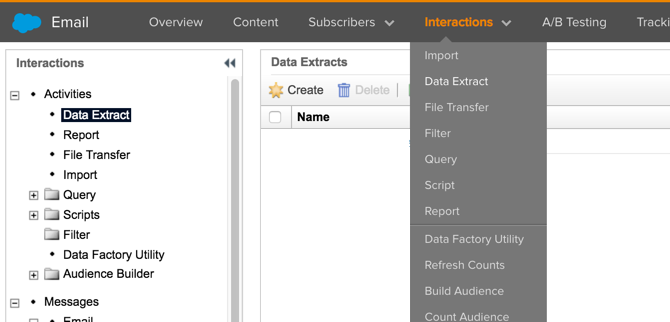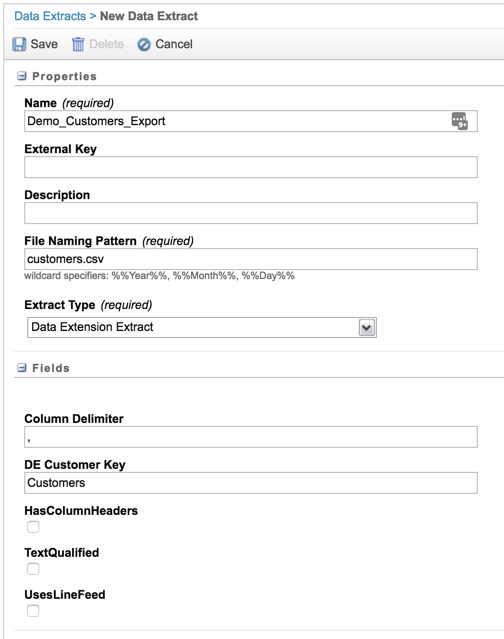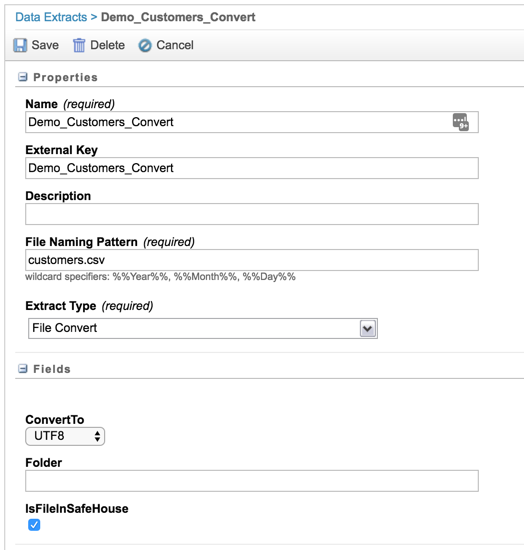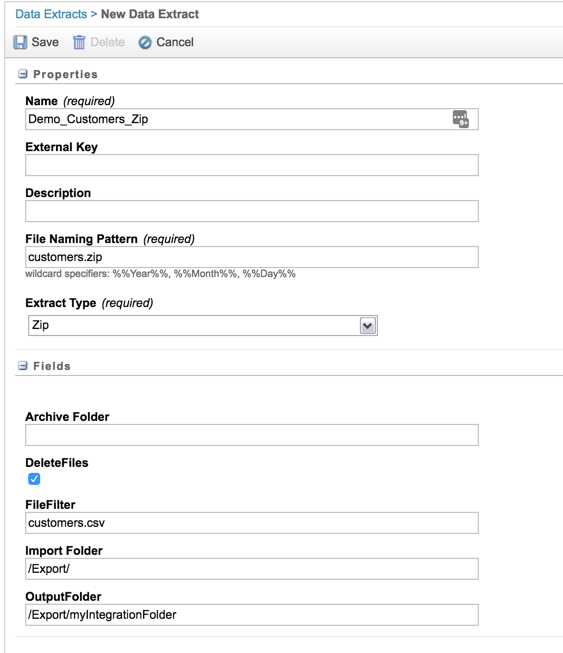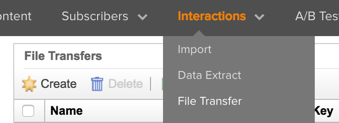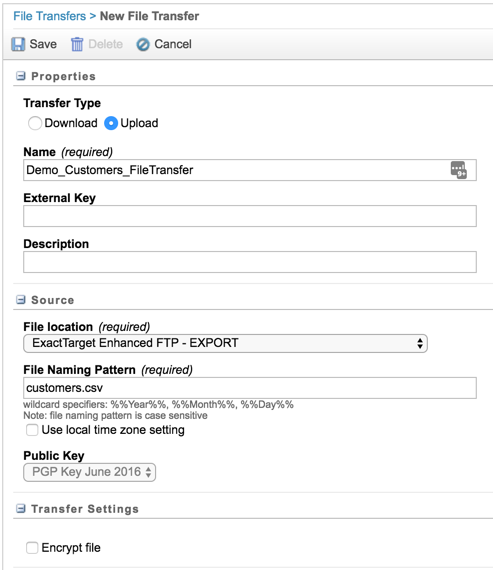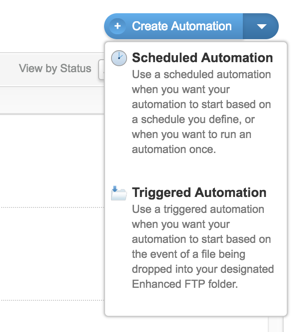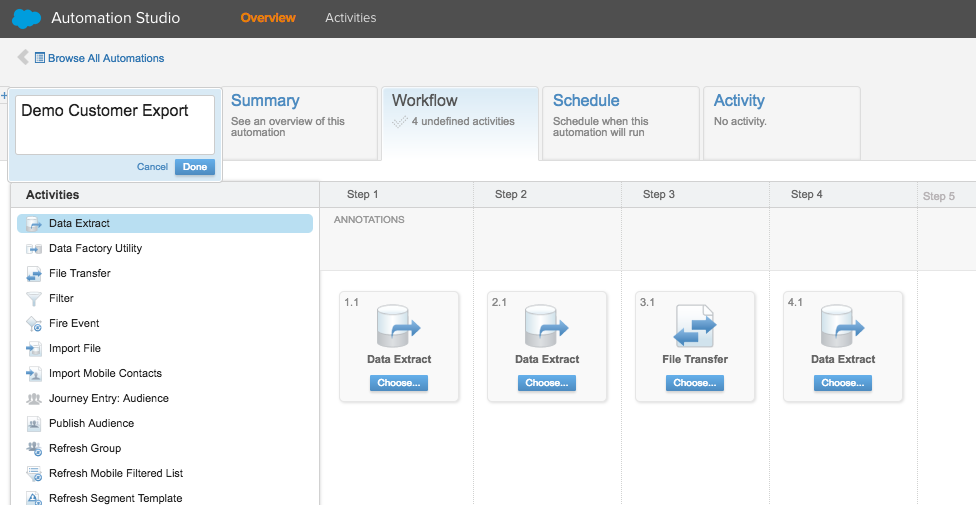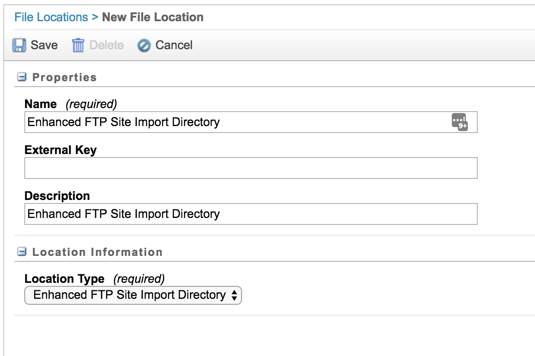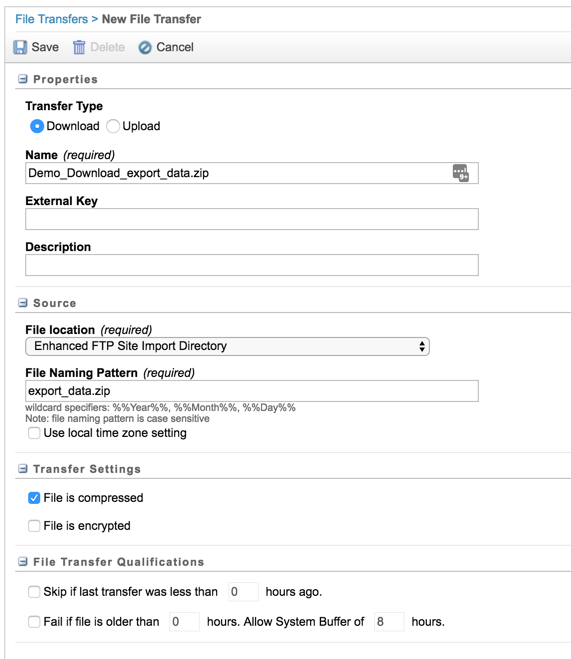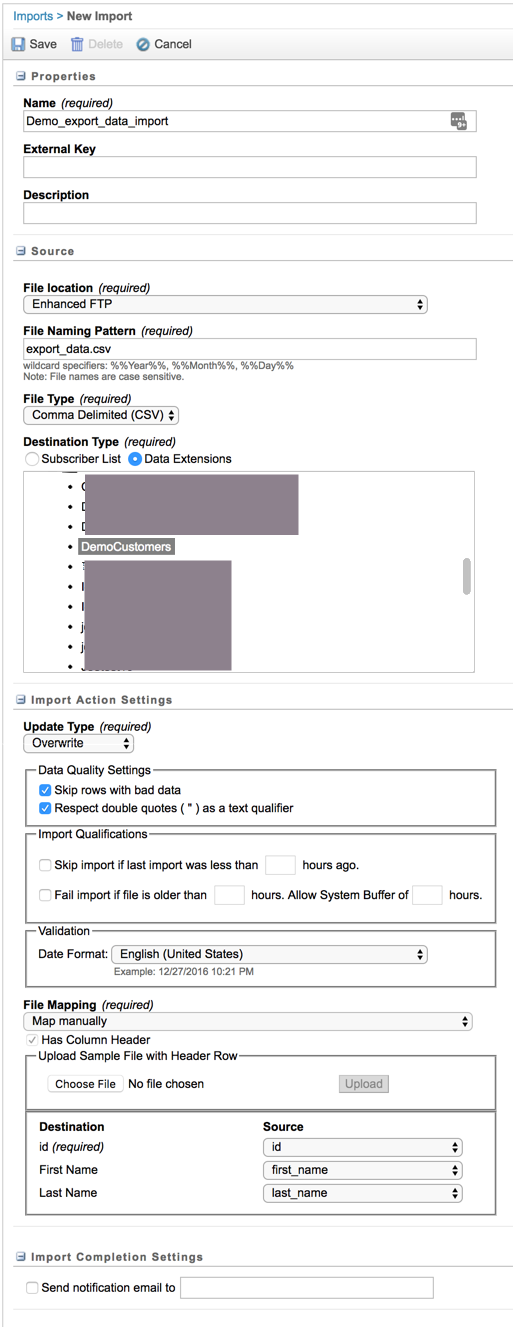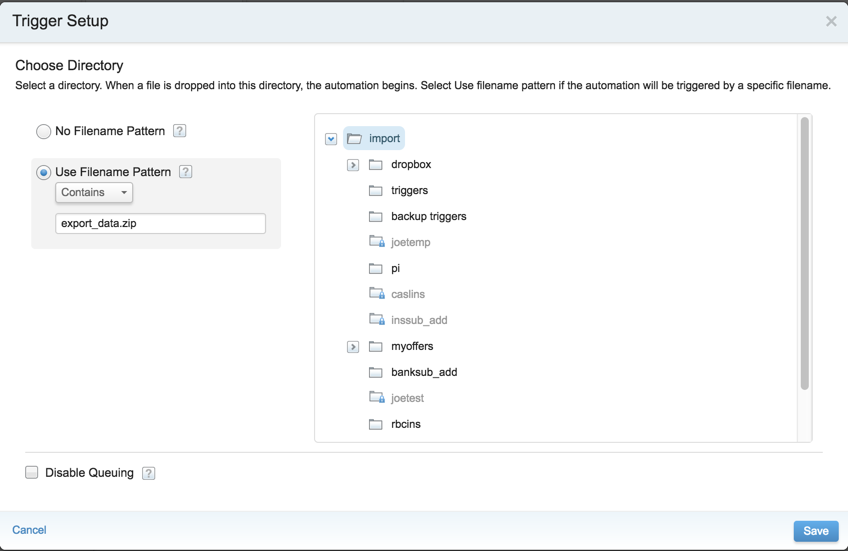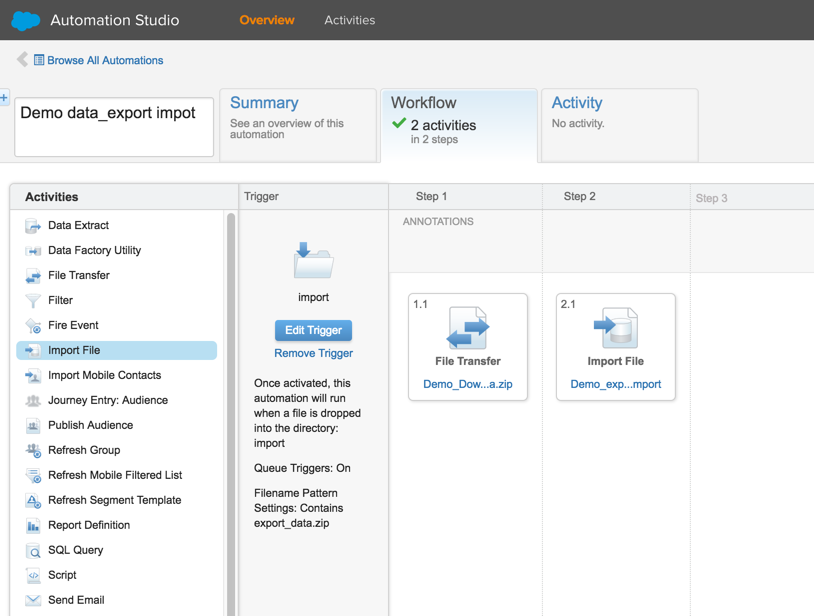Asynchronous communication technique for Heroku and Marketing Cloud
Table of Contents
- Getting Started
- From Marketing Cloud to Heroku
- From Heroku to Marketing Cloud
- Troubleshooting
- Contributors
Getting Started
Install packages
npm installnpm install -g typescript@2.0.3npm install -g typingstypings install
grunt default-watch
** This will monitor local files in the src folder and generate them to the build directory **
From Marketing Cloud to Heroku
Marketing Cloud push to Heroku is done in two steps:
- exporting DataExtention to zip file
- loading this file to Heroku and uploading it to the PostgreSQL.
Marketing Cloud setup
Make sure your Marketing Cloud account is provisioned with Mail, Automation Studio and Enhanced FTP.
Navigate to Email app and pick Interactions -> Data Extract in the top menu.
Create three Data Exports. To get started click Create.
Fill the form and click Save. Repeat twice more.
The output is three data exports: Demo_Customers_Convert, Demo_Customers_Export, Demo_Customers_Zip.
Navigate to File Transfers and click Create
Fill the form and click Save.
Navigate to Automation Studio
Create a new Scheduled Automation
Switch to Workflow tab and select Activities from the toolbox on the right and drop them into the working area.
For each step click Choose and pick activity created earlier.
- Step 1 -
Demo_Customers_Convert, - Step 2 -
Demo_Customers_Export, - Step 3 -
Demo_Customers_FileTransfer, - Step 4 -
Demo_Customers_Zip.
Save and click Run Once to verify that Automation is working. File will be moved to an ftp location.
Heroku App setup
Once the file is posted to FTP it can be loaded and copied to PostgreSQL.
Typically Export/Import jobs are run as one off dynos via scheduled jobs.
-
Ensure pg connection string is set in
/src/script/load_data.ts -
Ensure sftp credentials are set in
/src/lib/fileManager.ts -
Variables in
src/script/load_data.ts:pgConnectionString- to store PG connection stringsourceFileName- to store file name in sftp foldersourceFilePath- to store file path on sftp
-
changes to
src/script/load_data.sh_TableName- schema.table_name value where to load data_TableFields- comma separated list of fields which should match columns in the csv file.
-
run
grunt default-watchto compile TypeScript
Running Job
- Once the app is compiled, execute
node /build/script/load_data.jsto run it.
From Heroku to Marketing Cloud
Heroku push to Marketing Cloud is done in two steps:
- exporting PG table to zip file and uploading it to Marketing Cloud
- starting Automation Studio trigger and loading data to DataExtention
Heroku App setup
-
Ensure pg connection string is set in
/src/script/export_data.ts -
Ensure sftp credentials are set in
/src/lib/fileManager.ts -
variables in
src/script/export_data.ts:pgConnectionString- to store PG connection stringsourceFileName- to store file name that will be uploaded to ftp folderdestinationFileZipPath- to store file path on ftp
-
changes to
src/script/export_data.sh_SQL- sql query that generates data for export
-
run
grunt default-watchto compile TypeScript
Marketing Cloud setup
Make sure your Marketing Cloud account is provisioned with Mail, Automation Studio and Enhanced FTP.
Navigate to Email app.
Navigate to Admin and then click on Data Management on the right side -> File Locations. We will create/find location from where Marketing Cloud will load exported file from Heroku.
Find/Create location where Location Type is Enhanced FTP Site Import Directory
In top menu pick Interactions -> File Transfer and then click on Create
Fill the form.
Navigate to Interactions->Import and then click Create
Fill the form
Navigate to Automation Studio
Create a new Triggered Automation
In the newly loaded window switch to Workflow tab and click on Trigger Setup
Then select Activities from the toolbox on the right and drop them into the working area.
For each step slick on 'Choose' and pick activity created earlier.
- Step1 -
Demo_Download_export_data.zip, - Step2 -
Demo_export_data_import,
Save and make sure it's active.
Running Job
- now your Automation is set and you can send the file from Heroku to Marketing Cloud. Execute
node /build/script/export_data.jsto run it.
Troubleshooting
Typescript error 1
If you run into the following error:
typings/globals/require/index.d.ts(367,13): error TS2403: Subsequent variable declarations must have the same type. Variable 'require' must be of type 'NodeRequire', but here has type 'Require'.
>> 1 non-emit-preventing type warning
>> Error: tsc return code: 2
Warning: Task "ts:app" failed. Use --force to continue.
Aborted due to warnings.
Resolution
The issue is due to the module at "globals/require/index.d.ts" It appears that it is using Require instead of 'require'.
To fix this, remove the following line, from typings/index.d.s
/// <reference path="globals/require/index.d.ts" />
Cannot read property 'setUp' of null
If you run into the following error:
not ok 1 - TypeError: Cannot read property 'setUp' of null
---
at:
line: 285
column: 14
file: node_modules/nodeunit/lib/core.js
function: wrapGroup
stack: |
wrapGroup (node_modules/nodeunit/lib/core.js:285:14)
wrapGroup (node_modules/nodeunit/lib/core.js:306:24)
Object.exports.runModule (node_modules/nodeunit/lib/core.js:146:11)
node_modules/nodeunit/lib/nodeunit.js:75:21
node_modules/nodeunit/deps/async.js:513:13
iterate (node_modules/nodeunit/deps/async.js:123:13)
node_modules/nodeunit/deps/async.js:134:25
node_modules/nodeunit/deps/async.js:515:17
node_modules/nodeunit/lib/core.js:165:9
node_modules/nodeunit/deps/async.js:518:13
async.forEachSeries (node_modules/nodeunit/deps/async.js:119:20)
_concat (node_modules/nodeunit/deps/async.js:512:9)
Object.concatSeries (node_modules/nodeunit/deps/async.js:152:23)
Object.exports.runSuite (node_modules/nodeunit/lib/core.js:96:11)
Object.exports.runModule (node_modules/nodeunit/lib/core.js:158:13)
node_modules/nodeunit/lib/nodeunit.js:75:21
test: TAP
message: 'TypeError: Cannot read property ''setUp'' of null'
source: |
if (group.setUp) {
Resolution
The issue is due to a missing null check in the nodeunit core.js file.
The issue is likely because a property was assigned null on the exports of the unit test somehow.
You can likely only find out which one it is by adding the following line at: /usr/local/lib/node_modules/nodeunit/lib/core.js before of the line 285
//Added line
if(!group) return;
See here for more information: caolan/nodeunit#198

